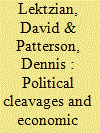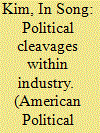|
|
|
Sort Order |
|
|
|
Items / Page
|
|
|
|
|
|
|
| Srl | Item |
| 1 |
ID:
185977


|
|
|
|
|
| Summary/Abstract |
The literature on South Korean elections has shown that voters’ region, ideology, and generation shape their preferences at the polls. Few studies, however, have investigated the long-term effects of these variables or the difference in the effects of ideology and generation between regions. In this article, we generate theoretical expectations of Korean voters’ voting behavior, analyzing cleavage structures in the party system since democratization, and we then examine the interactive effects of region with ideology and generation across voters from Gyeongsang and Jeolla, in six presidential elections from 1992 to 2017. We find that ideology and generation have stronger effects among Gyeongsang voters than among Jeolla voters. To be specific, ideology and generation often divide Gyeongsang voters, especially when the Democratic Party nominates a presidential candidate from Gyeongsang; Jeolla voters are more homogeneous in their support for the party, regardless of their ideology and generation.
|
|
|
|
|
|
|
|
|
|
|
|
|
|
|
|
| 2 |
ID:
138298


|
|
|
|
|
| Summary/Abstract |
We develop and test a theory, based on the Stolper–Samuelson Theorem, of the effectiveness of sanctions. We treat sanctions as exogenously imposed changes in a country's exposure to international markets. In a country with an open-trade regime, owners and intensive users of the abundant factor of production hold economic and political power. In a country closed to trade, however, economic and political power rests with owners and intensive users of scarce factors. Thus, if real rates of return to the abundant factor decline during sanctions against a trade-open country, or real rates of return to the scarce factor decline during sanctions against a trade-closed country, we expect these economically and politically powerful segments of the targeted country to push hard for policy changes that would bring about an end to sanctions. Statistical analysis of sanctions episodes initiated between 1971 and 2000 provides support for the paper's expectations.
|
|
|
|
|
|
|
|
|
|
|
|
|
|
|
|
| 3 |
ID:
172503


|
|
|
|
|
| Summary/Abstract |
Using Lipset and Rokkan’s cleavage theory in an Indigenous context, the article compares political cleavages in internal Sámi politics in Norway and Sweden. The authors discuss the historical legacies of each country’s policies toward the Sámi and subsequent development of party systems before using survey data to analyze cleavages within the Sámi electorates. The analysis shows a prominent cleavage in Sámi politics in Norway regarding the extent of Sámi self-determination, whereas the main cleavage in Sweden can be found in the category-split between reindeer herders and other Sámi created by state policy. Contemporary cleavages in Indigenous politics may, thus, be deeply rooted in nation-building processes.
|
|
|
|
|
|
|
|
|
|
|
|
|
|
|
|
| 4 |
ID:
153760


|
|
|
|
|
| Summary/Abstract |
Existing political economy models explain the politics of trade policy using inter-industry differences. However, this article finds that much of the variation in U.S. applied tariff rates in fact arises within industry. I offer a theory of trade liberalization that explains how product differentiation in economic markets leads to firm-level lobbying in political markets. High levels of product differentiation eliminates the collective action problem faced by exporting firms while import-competing firms need not fear product substitution. To test this argument, I construct a new dataset on lobbying by all publicly traded manufacturing firms from reports filed under the Lobbying Disclosure Act of 1995. I find that productive exporting firms are more likely to lobby to reduce tariffs, especially when their products are sufficiently differentiated. I also find that highly differentiated products have lower tariff rates. The results challenge the common focus on industry-level lobbying for protection.
|
|
|
|
|
|
|
|
|
|
|
|
|
|
|
|
|
|
|
|
|